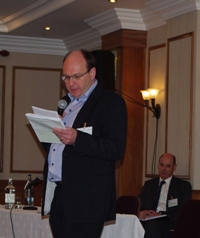Partnership is key to sustainable food production

Professor Nigel Scollan speaking at the Conference.
04 February 2013
That was the central theme to emerge from a ground-breaking conference in Birmingham, UK, last week which was organised by the Centre of Excellence for UK Farming & Farming Futures (CEUKF/FF) in partnership with the Agriculture and Horticulture Development Board (AHDB).
The conference which was supported by the Biotechnology and Biological Sciences Research Council (BBSRC) and the Biosciences Knowledge Transfer Network brought together scientists, farmers, food manufacturers, retailers and policy-makers to share the latest information.
It focused on the rapid progress taking place to measure, benchmark and drive improvements across key performance indicators such as greenhouse gas emissions, energy and water consumption, land use and biodiversity impact.
The conference was the first of its kind to focus entirely on new metrics for sustainable agriculture, and to assemble the leading proponents in this area from industry alongside the scientific community.
Combined pressures of population growth, climate change and declining natural resources are leading to a global drive for ‘sustainable intensification’ in agriculture. But delivering this vital change requires new tools and initiatives to measure and compare the productivity, resource-use efficiency and environmental impact of farming and food production systems. Or as one speaker put it “You have to measure it to manage it”.
Only through close cooperation and partnership between scientists, industry and Government can we hope to ensure a consistent approach and direction in the drive to meet complex sustainability and production targets across diverse product sectors and farming systems.
CEUKF Chairman Lord Curry of Kirkharle said: “The diverse range of initiatives highlighted at this conference, and the enormous interest it has generated among delegates from the UK and overseas, demonstrates the urgent need for a joined-up UK approach to defining, benchmarking and driving improvements in sustainable efficient production. “CEUKF is taking a lead as a focal point for industry and the science base to work together and share expertise and knowledge in this area. “Over the past year, CEUKF has expanded to embrace leading research and knowledge transfer expertise from across the UK. With ongoing support from Waitrose, CEUKF partners now include IBERS-Aberystwyth, NIAB/TAG, AFBI, SRUC and Harper Adams University.“Our ultimate objective is to identify and promote best practice in sustainable efficient production among UK farmers, through innovation and knowledge transfer in technology, production systems and on-farm management.”
Professor Ian Crute, Chief Scientist of AHDB who co-sponsored the conference said: “This conference highlighted just how much is being done throughout the agricultural supply chain to identify where and how it is possible to reduce the environmental impacts of food production at the same time as responding to the ever-growing demand for safe, secure sources of high quality products. “However, the conference also highlighted how much more there is to do before it will be possible to confidently qualify and compare the different environmental impacts of diverse production systems in widely varying localities. There is no easy solution to equating impacts on such things as water use, net greenhouse gas emissions, valued landscapes and conservation of wildlife.
Deciding to make change requires understanding and analysis of trade-offs so that farmers and growers can optimise their operations in ways that are appropriate to their local circumstances and markets.
“This conference forcefully demonstrated the vital importance of a joined-up approach between producers, manufacturers and retailers drawing on the best scientific knowledge. The contributions emphasised that sustainability is not about warm words and good story-lines that enable firmly-held beliefs to be reinforced and marketed. It’s all about measurements, analysis and digestion of facts that may sometimes be unpalatable.”



